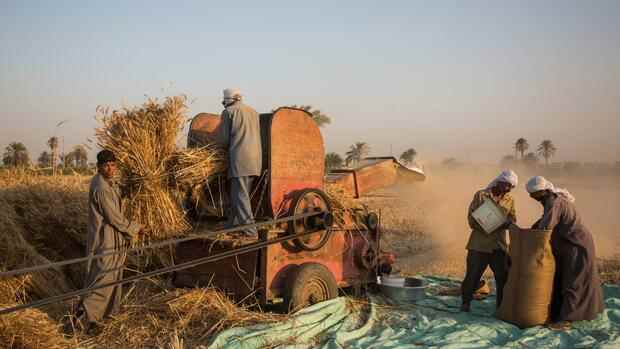In 2022, a food crisis is hardly avoidable.
(Photo: Bloomberg)
Becoming less vulnerable to blackmail is one of the lessons drawn from Russia’s war in Ukraine and repeated like a mantra at the World Economic Forum in Davos. Become independent from Russian oil and gas, from important minerals, shielded from China for security-related technologies. No end to globalization, but more protected in security-related areas and more diversified.
But the world is particularly open to blackmail and dependent when it comes to food production – here, too, the war in Ukraine has revealed the many weak points that have actually been known for years and which are not talked about enough and only now too late. The world depends on a few countries for the supply of wheat like fertilizer.
It is only because of these dependencies that the blockade of Ukrainian ports by Russian soldiers, fertilizer export bans in Russia and China can turn an already dramatic situation into a famine in such a short time – perhaps the worst since World War II, experts warn.
In the short and medium term, action must be taken now. It will be crucial for the survival of millions of people, especially in Africa, whether Russia lifts its blockade of Ukrainian ports. 20 to 25 million tons of wheat are waiting there for delivery to the world. Only a fraction can be exported overland.
Top jobs of the day
Find the best jobs now and
be notified by email.
In the short term, the grain must be able to leave Ukraine
Will countries like Great Britain set up an international protection zone in the Black Sea, allowing Ukrainian ships safe passage to transport the wheat? The Black Sea becomes the next front line in the Ukraine war. This shows how direct the effects of geopolitics are on our food.
A “safe zone” sounds – similar to “no-fly zone” – like something that would be easy to implement. But if the international community fails to get the grain out of the Ukrainian ports without allowing Putin to blackmail it and relax the sanctions, that would be an indictment. Politicians in Europe and the USA know this and have finally intensified negotiations on opening up the ports.
In the face of historic figures of starvation worldwide, UN Secretary-General Guterres has increased pressure on Russia over the blockade of Ukrainian grain.
(Photo: dpa)
But even if it is possible to empty the silos in Ukraine in time for the next harvest, the food crisis this year will only be alleviated, not avoided. Only around half of the fresh grain harvest is expected from the Ukraine this year. Droughts in the Middle East, a heat wave in India, higher fuel prices for farmers in Africa, less fertilizer in Europe, North and South America: 2022 will be a difficult year.
In the medium term, global food production must become more crisis-proof
The Davos mantra of wanting to be more globally diversified, more resilient and less susceptible to blackmail must also have consequences in global food production. The production and processing of the three main foodstuffs, wheat, corn and rice, is concentrated in a few regions. This high concentration is too risky, as we now see – and that needs to change.
This can only succeed through more efficient cultivation in many countries. A broader spectrum of seeds and more climate-friendly forms of cultivation are needed – because agriculture not only suffers from climate change, it also accelerates it as a greenhouse gas generator.
Equally important are investments in Africa in irrigation systems and better storage facilities that prevent post-harvest losses – without the money running out – and an end to trade barriers.
>>> Read here: “We will have famines” – Why the food crisis can hardly be stopped
But the problem is that the successes take time and will only help to a limited extent this year. So we run into the crisis with our eyes wide open. Nevertheless, there is no way around making global agriculture less risk-prone.
If we cannot feed 7.9 billion people properly today, only with such steps can we succeed in doing so in 2050 for the expected nine billion people in times of climate change.
More: CO2 sinners in agriculture: How carbon farming is supposed to save the climate
